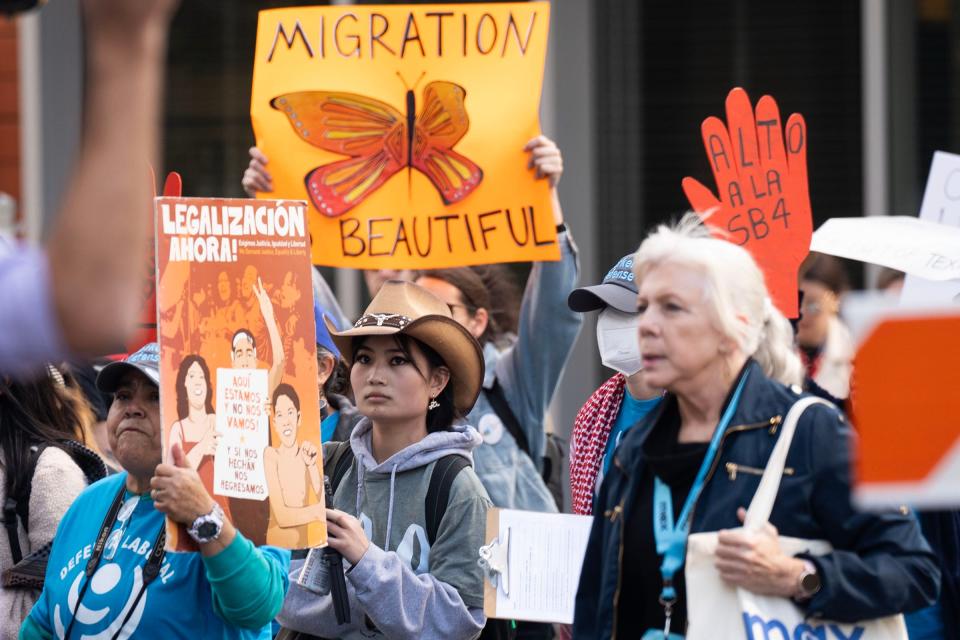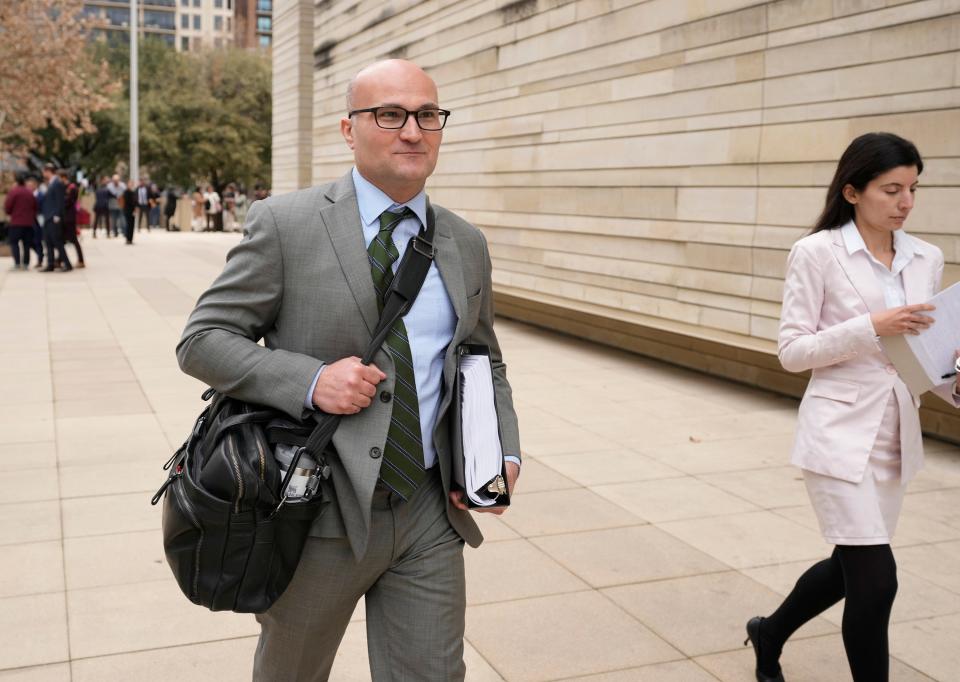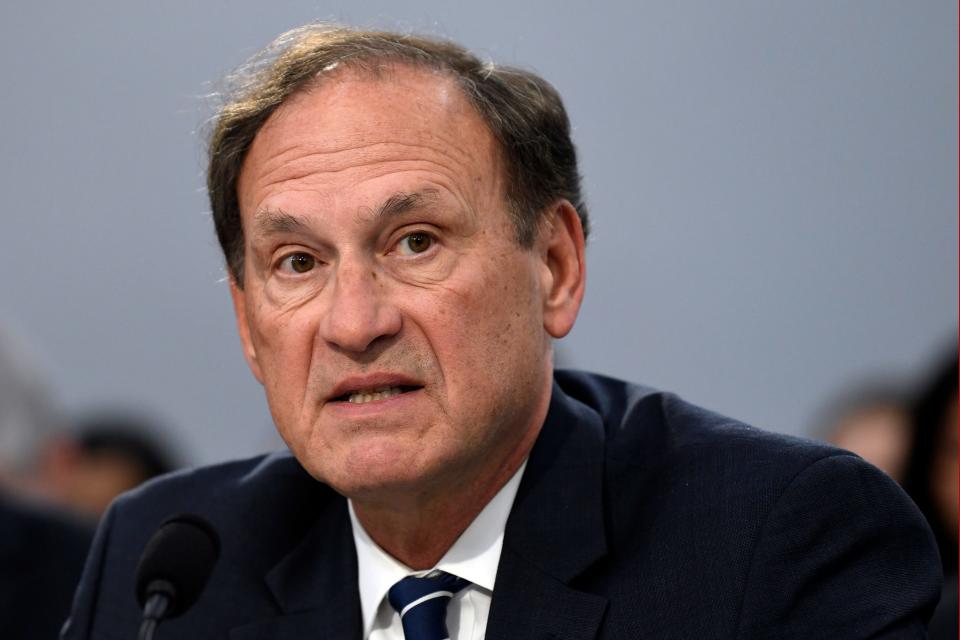US Supreme Court maintains hold on SB 4, continues mulling Texas' sweeping immigration law
The U.S. Supreme Court is extending a hold on a new Texas law that grants state law enforcement officers authority to arrest and deport migrants as the high court continues to consider the policy, which civil rights groups and federal officials have called unconstitutional.
In a brief order Tuesday, Justice Samuel Alito extended the court's stay on Senate Bill 4, keeping the law from taking effect until at least 4 p.m. March 18. Gov. Greg Abbott signed SB 4 into law in December, and it was set to go into effect March 5 before rights groups and the Justice Department challenged the new legislation's constitutionality.
The Supreme Court picked up the case March 4, when the federal government appealed a 5th U.S. Circuit Court of Appeals order overruling a federal district court's order to delay SB 4 from taking effect until the constitutional challenges filed by the Justice Department, ACLU, ACLU of Texas, Las Americas Immigrant Advocacy Center, American Gateways, the Texas Civil Rights Project and El Paso County are settled.
The order to extend the stay, which had been scheduled to expire Wednesday, comes a day after attorneys representing Abbott, the Texas Department of Public Safety Director Steve McCraw and the state filed a response to the high court pointing to SB 4 as valid, complementary to existing federal law and a necessary reaction to a surge in migrants arriving to the Texas-Mexico border — a crisis state officials have likened to an invasion.

"The State’s injury is even sharper than usual here, moreover, because Texas is the nation’s first-line defense against transnational violence and has been forced to deal with the deadly consequences of the federal government’s inability or unwillingness to protect the border," the state's attorneys wrote to the court.
More: Texas AG denied faith-based nonprofit's records on migrants until case is heard in court
However, federal prosecutors, joined by several migrant advocacy groups and El Paso County, have argued in their lawsuit that SB 4 creates a "blatantly unlawful" system that is a clear and unconstitutional overstep into the federal government's authority.
"The regulation of entry and removal is an exclusively federal domain," the prosecutors argued. "This Court has made that clear, over and over, for 150 years."
If the law were to take effect, the prosecutors said in appealing to the Supreme Court, the result would entail "widespread arrests" for crimes preempted by federal law, an adjustment to an immigration system contradictory to federal objectives, and "confusion and chaos at ports of entry as state officers issue state deportation orders."
"Challenges to the authority of the federal government and to this Court’s precedents do not come much more direct than that," the prosecutors wrote.
The Legislature during a special session in November passed SB 4, creating a series of penalties for anyone suspected of illegally crossing into Texas from Mexico other than through an international port of entry. The penalties range from a Class B misdemeanor to a second-degree felony.

SB 4, which faced heavy opposition from Democrats and civil rights groups throughout the 2023 legislative calendar, also requires people accused of illegally crossing into Texas to either accept a magistrate judge's deportation order or face a second-degree felony charge for noncompliance.
"We welcome this decision by the U.S. Supreme Court extending the stay of SB 4," said El Paso County Attorney Jo Anne Bernal in a statement Tuesday. "Each day this law is prevented from being enforced is a day that protects El Paso County from serious harms. We hope to soon have a decision that fully invalidates this divisive and dangerous law.”
Previously, Judge David Ezra of the U.S. District Court for the Western District of Texas ruled that "several factors" warranted an injunction of SB 4, citing numerous concerns over the law's constitutionality and saying that allowing it to take effect would amount to "nullification of federal law and authority."

On March 2, a day after Ezra's ruling, a three-judge panel on the 5th Circuit Court issued a ruling to let the law take effect seven days later unless the Supreme Court intervened.
“We are pleased the stay will remain in place, blocking a racist, unconstitutional law from going into effect as the case makes its way through the legal process," Tami Goodlette, director of the Beyond Borders Program at the Texas Civil Rights Project, said Tuesday. "No state has the right to implement its own immigration policies that threaten to upend the lives of people for simply seeking safety, better opportunities, and a place to call home in Texas.”
The state's attorneys are seeking to allow Texas' previous appeal before the 5th Circuit to be argued in front of that court as scheduled on April 3. The attorney general's office did not respond to an American-Statesman request for comment.
More: Texas House speaker appoints committee to investigate Panhandle wildfires
Texas' new challenge to SB 4
The Mexican American Legal Defense and Educational Fund and the National Immigration Law Center on Tuesday filed a new lawsuit against Texas over SB 4.
In their suit, filed in the U.S. District Court for the Western District of Texas in Austin, the two organizations argue that the state's immigration provisions are a violation of the Fourth, Eighth and Fourteenth Amendments and an intrusion into federal authority.
Brought on behalf of migrant advocacy group La Union del Pueblo Entero, or LUPE, and four Texas residents who currently have available pathways to U.S. citizenship or have pending immigration applications before the federal government, the new lawsuit says SB 4 subjects the plaintiffs to an unlawful series of criminal penalties that specifically neglect constitutional protections from illegal searches and seizures and cruel and unusual punishments.
"SB 4 is another unconstitutional attack by Texas on the civil rights of Latinos and all immigrants,” said Fátima Lucía Menéndez, MALDEF Southwest regional counsel in a statement announcing the new lawsuit Tuesday. “MALDEF is proud to represent LUPE in the challenge against SB 4 and will continue to fight against misguided laws fueled by xenophobia.”
This article originally appeared on Austin American-Statesman: Supreme Court continues delay on Texas immigration law taking effect
Solve the daily Crossword

